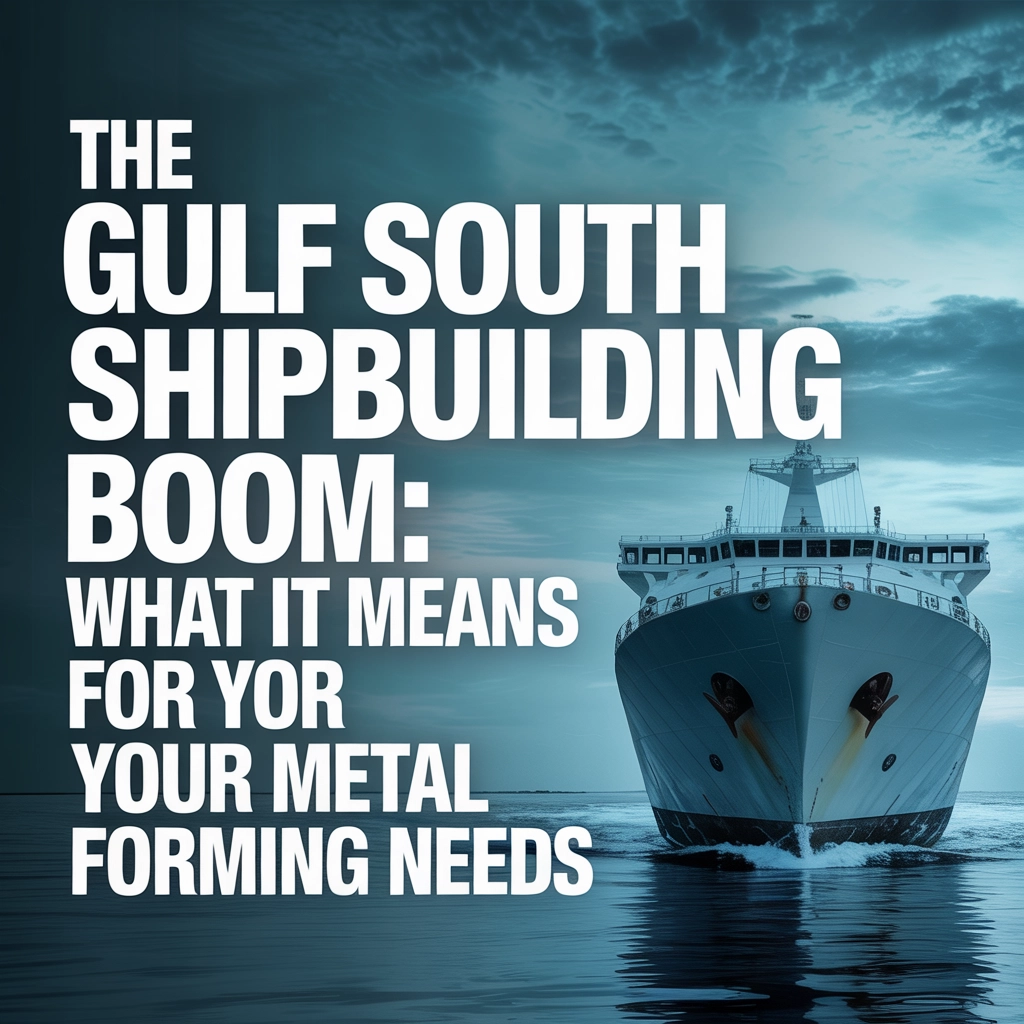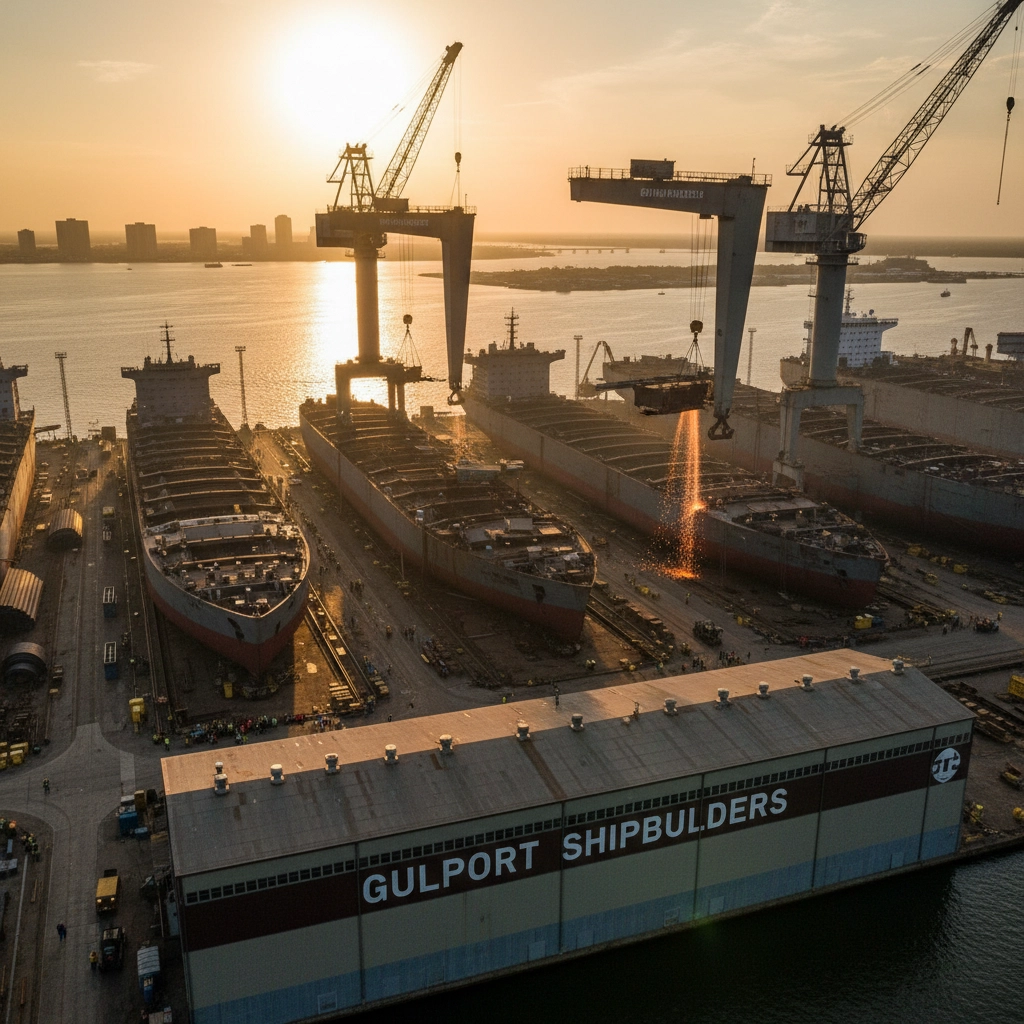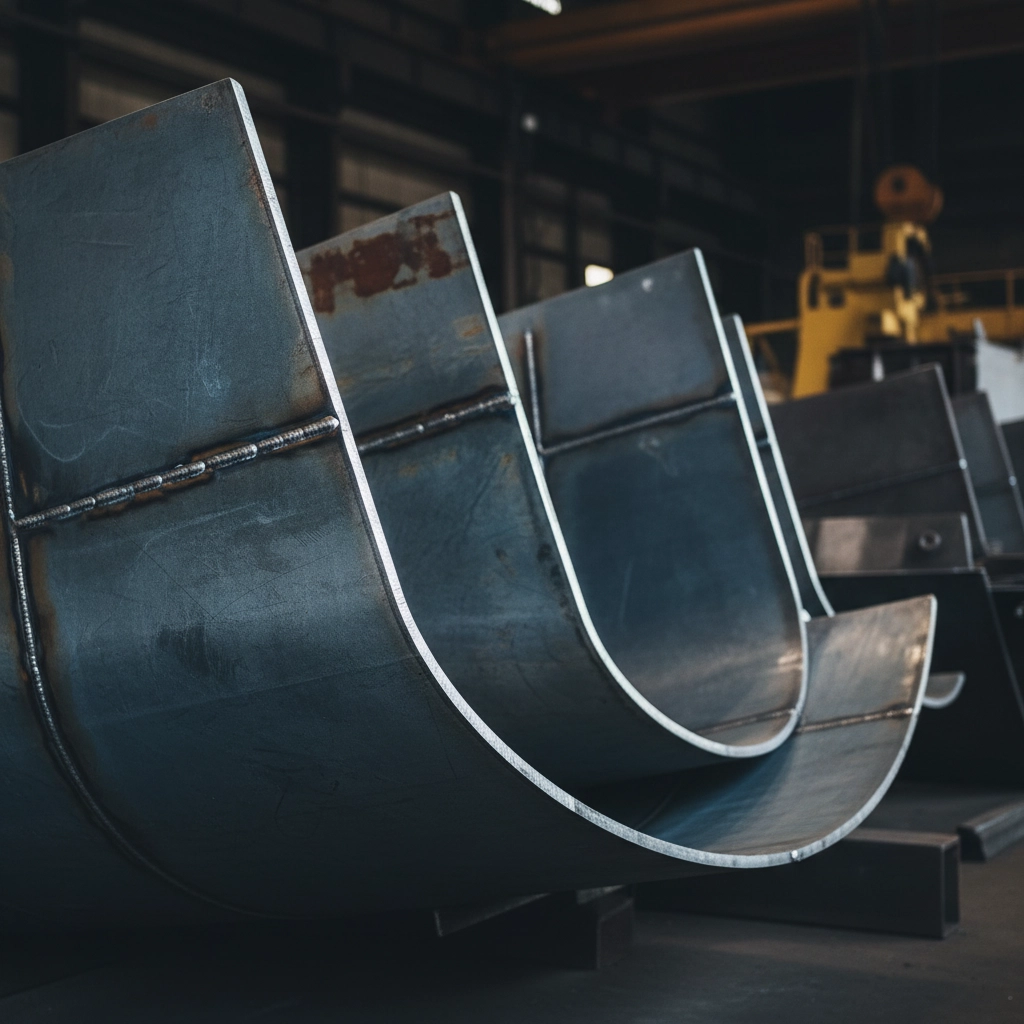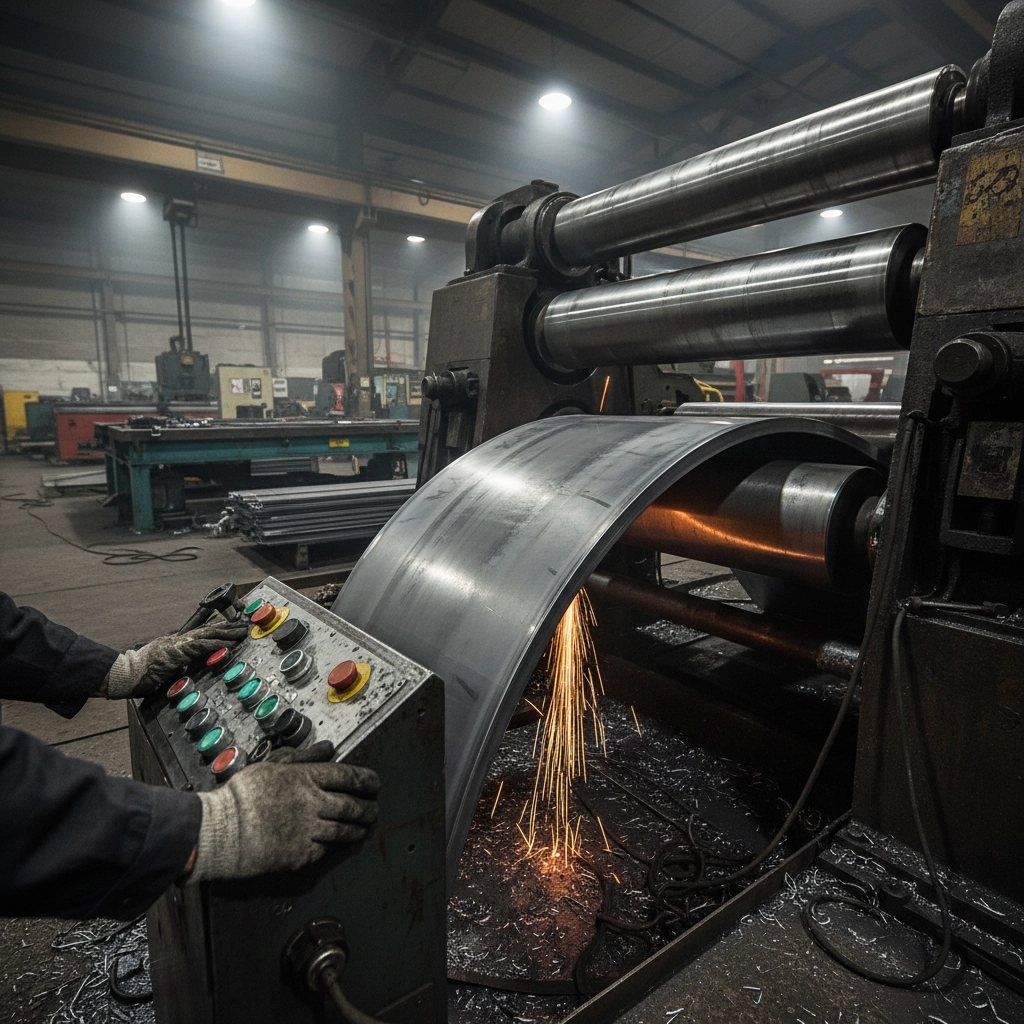
If you've been keeping an eye on the Gulf Coast lately, you've probably noticed something exciting happening. Shipyards are busier than they've been in years, cranes are working overtime, and there's a real sense that American shipbuilding is making a comeback. This isn't just good news for the maritime industry: it's creating massive opportunities for metal forming companies like ours.
The numbers tell the story. Just this past July, the federal government announced $8.75 million in grants through the Maritime Administration's Small Shipyard Grant program, with nine of the 17 awarded shipyards located right here along the Gulf Coast and inland waterways. That's serious money flowing into our region, and it's just the tip of the iceberg.
What's Driving This Shipbuilding Renaissance?
Several factors are coming together to create this perfect storm of opportunity in Gulf South shipbuilding.
Federal Investment and National Security Priorities
The federal government has finally woken up to the fact that America's shipbuilding capacity is embarrassingly small compared to our global competitors. While China builds nearly half of all commercial ships worldwide, the U.S. produces less than 1% of global commercial vessels. Over the past decade, China launched 6,765 commercial ships while we managed just 37. That's not just a trade imbalance: it's a national security issue.
The Small Shipyard Grant program has distributed over $320 million since 2008, and the momentum is building. Proposed legislation like the SHIPS for America Act would require certain vessels to be built in U.S. shipyards under American regulations, creating sustained demand for domestic suppliers.

Offshore Energy Diversification
Here's where things get really interesting for metal forming companies. Gulf Coast shipyards are no longer just focused on oil and gas: they're pivoting to offshore wind and other renewable energy projects. This diversification is smoothing out the boom-bust cycles that traditionally plague energy-dependent shipyards, creating more consistent demand for fabrication services year-round.
Austal USA in Alabama is a perfect example. They've invested heavily in steel manufacturing capabilities to complement their aluminum expertise, positioning themselves to serve both Navy and Coast Guard steel ship requirements. When major players like this expand their metal working capabilities, it creates ripple effects throughout the entire supply chain.
Supply Chain Advantages
One thing that makes the Gulf South particularly attractive for shipbuilding is our established supply chain network. Steel comes from Alabama, North Carolina, and Texas. Engines and controls arrive from Indiana, Georgia, and Ohio. Fabrication and components flow in from Wisconsin, Illinois, Pennsylvania, and dozens of other states. This national network creates opportunities for metal forming companies across the region to get involved in shipbuilding projects.
What This Means for Metal Forming Demand
The shipbuilding boom translates directly into increased demand for virtually every type of metal forming service you can imagine.
Diverse Manufacturing Requirements
Modern shipbuilding utilizes almost every metal forming method in the book. We're talking about sheet metal production using rolling mills, die casting for complex engine housings, sand casting for large structural components like hull sections, powder metallurgy for precision parts, and extensive extrusion work. If you can form, cut, bend, or shape metal, there's probably a place for your services in this supply chain.
Plate Work Takes Center Stage
Here at Hooley Manufacturing, we're seeing particularly strong demand for plate forming and cutting services. Shipbuilding requires massive amounts of precisely formed plate work: hull sections, bulkheads, deck plates, and structural components that need to meet exact specifications while handling the stresses of marine environments.

Quality and Precision Requirements
Shipbuilding isn't forgiving when it comes to quality. Components need to meet strict maritime standards, handle saltwater corrosion, and perform reliably in challenging conditions. This creates opportunities for metal forming companies that can deliver consistent, high-quality work while meeting tight deadlines.
The good news? North American metal fabricators have significant competitive advantages. We offer qualified suppliers with established reputations, in-house logistics capabilities, and the flexibility to work closely with shipbuilders on custom solutions. Long-term partnerships eliminate the need for shipyards to maintain extensive in-house metalworking divisions while providing ongoing technical advice for material selection and specialized applications.
How Hooley Manufacturing Fits Into This Picture
We've been serving the marine and heavy industrial markets for decades, so this shipbuilding boom feels like a natural fit for our capabilities. Our experience with precision plate forming, fast turnarounds, and ability to work from anything: detailed blueprints or rough sketches: puts us in a perfect position to support shipyard projects.
Decades of Marine Industry Experience
We've been forming metal for marine applications long before this current boom started. That experience matters when you're dealing with the unique challenges of maritime fabrication: understanding how different alloys behave in marine environments, knowing which forming techniques work best for specific applications, and having the expertise to suggest improvements to original designs.
Speed When It Matters
Shipyard projects often work on tight timelines, especially when vessels are in dry dock for repairs or modifications. Our reputation for fast turnarounds isn't just nice to have: it's essential when a delayed delivery could mean keeping a multi-million-dollar vessel out of service for extra days or weeks.
Flexibility in Project Requirements
One thing we love about shipyard work is the variety. Some projects come with detailed engineering drawings and specifications. Others start with a quick sketch on a napkin and a phone call saying "we need this part by Friday." Our team thrives on both types of challenges, and we've built our processes to handle everything from precisely engineered components to rapid-fire custom fabrication.

Industries We're Supporting
The Gulf South shipbuilding boom isn't limited to traditional commercial vessels. We're seeing increased activity across multiple maritime sectors:
Shipbuilding and New Construction
New vessel construction creates demand for everything from structural components to specialized fittings. Whether it's commercial cargo ships, military vessels, or specialized work boats, new construction projects require extensive plate forming and custom fabrication work.
Offshore Marine and Energy
The offshore energy sector: both traditional oil and gas and renewable wind projects: requires specialized vessels and platforms. These projects often need custom-formed components that standard suppliers can't provide, creating opportunities for flexible fabricators like us.
Barge Repair and Modification
The inland waterway system is busier than ever, and that means more wear and tear on the barge fleet. Repair and modification work keeps vessels operating efficiently while extending their service life. This sector provides steady, consistent demand for plate forming and custom fabrication services.
Heavy Industrial Marine Support
Ports, terminals, and marine service facilities need ongoing support for everything from loading equipment to dock infrastructure. These projects often require heavy-duty formed components that can handle the demanding marine environment.
The Opportunity Is Now
The Gulf South shipbuilding boom represents more than just a temporary uptick in maritime activity: it's a fundamental shift toward rebuilding American maritime capabilities. For metal forming companies positioned to serve this market, the opportunities are significant and likely to continue growing.
Success in this market requires understanding the unique demands of maritime applications, maintaining the quality standards the industry demands, and building the relationships necessary to become a trusted partner rather than just another supplier.
At Hooley Manufacturing, we're excited about what this boom means for our customers and our community. We've got the experience, equipment, and expertise to help shipyards and marine contractors get their projects done right and on time.
Ready to Get Started?
Whether you're working on new construction, repairs, modifications, or custom projects, we'd love to discuss how our metal forming capabilities can support your shipyard operations. From detailed engineering drawings to rough sketches, we can help turn your ideas into precisely formed metal components.
Don't let project delays keep your vessels out of service longer than necessary. Contact us today for a fast estimate on your next plate forming or custom fabrication project. Let's talk about how Hooley Manufacturing can help you take advantage of the Gulf South shipbuilding boom.
